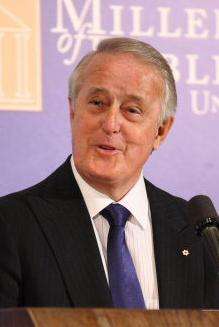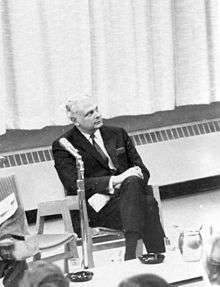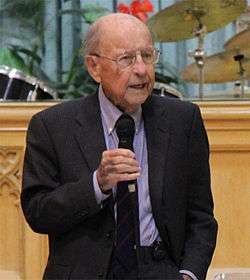Progressive Conservative leadership election, 1976
Progressive Conservative Party leadership election, 1976

|
|
|
|
|
|
|
The 1976 Progressive Conservative leadership election was held at the Ottawa Civic Centre in Ottawa on February 22, 1976,[1] to elect a leader of the Progressive Conservative Party of Canada to replace Robert Stanfield, who had resigned after losing the 1968, 1972, and 1974 elections. It unexpectedly elected a 36-year-old, little-known PC Member of Parliament from Alberta as the party's new leader. Joe Clark defeated Claude Wagner on the fourth ballot of the convention by a margin of 65 votes.[1]
The convention's delegates were elected by the party's riding associations, along with the party's youth, campus and women's associations. There were also numerous ex officio delegates, including PC Members of Parliament, defeated candidates from the previous election, members of provincial legislatures, members of the party's national executive and the executives of provincial parties affiliated to the federal party. Delegates cast secret ballots, so their votes were not "tied" to any candidate. After each ballot, the candidate winning the fewest votes was removed from the ballot for the next round. Several candidates withdrew voluntarily when it became clear that they would not be able to win.
Candidates
- Claude Wagner, 50, was the front-runner going into the convention. A former Liberal Minister of Justice in the government of Quebec. Wagner's support came from party members who believed that having a Quebec francophone leader would enable the party to expand its support in Quebec, where the party was usually soundly defeated by the Liberal Party of Canada in elections. Wagner's "law and order" image as Quebec justice minister appealed to many on the party's right wing.
- Brian Mulroney, 36, was a lawyer from Quebec who had grown up in a bilingual family and was also seen as a candidate who could appeal to Quebec. Mulroney had never run for public office before, however, and alienated many party members with his slick appearance and his very expensive campaign. He was largely unable to build on the base of support that he brought to the convention. After placing second on the first ballot, Mulroney fell behind Clark on the second ballot as Red Tory delegates began to coalesce behind Clark. After delegates began to desert Mulroney on the third ballot, he was forced out of the race. Mulroney later defeated Clark for the leadership at the 1983 leadership convention. Wagner's campaign appealed to Mulroney delegates to come to him as a fellow Quebecer while Clark's campaign appealed to them on the basis of Mulroney and Clark both being on the left of the party. Key operatives in Mulroney's campaign included Ontario PC president Alan Eagleson and Newfoundland Premier Frank Moores. Murloney was endorsed by only two sitting Members of Parliament, Heath MacQuarrie (Hillsborough) and James McGrath (St. John's East).[2]
- Joe Clark, 36, had been the Member of Parliament for Rocky Mountain, Alberta since the 1972 federal election. A Red Tory, in his youth he had served two terms as president of the Progressive Conservative Youth wing. Prior to being elected to parliament, Clark was a journalist, political science teacher, and party worker.[1]
- Jack Horner, 48, had been a Member of Parliament from Alberta since 1958 and was a cattle rancher. He was considered to be a maverick and attracted votes from right-wing westerners. Horner placed fourth in the first ballot, but as right-wing delegates flocked to Wagner, Horner was unable to increase his vote significantly, and dropped out after the second ballot. After losing the leadership, he joined the Liberal Party and immediately became a minister in the Trudeau government despite his hard-line right-wing views and his harsh criticism of the Liberal government. He was defeated in the 1979 election, and was later appointed to the board of directors of the Canadian National Railway when Trudeau was returned to power in 1980. Horner was endorsed by former Prime Minister John Diefenbaker.[1]
- Paul Hellyer, 52, was a popular, long-term Liberal cabinet minister from Toronto who had been defeated by Pierre Trudeau at the 1968 Liberal leadership convention. After leaving the Liberal Party, Hellyer had attempted to establish a new party under his own leadership, the Action Canada movement. This was unsuccessful, and Hellyer joined the PC Party. Hellyer seriously damaged his bid for the PC leadership during his convention speech, when he criticized centrist Red Tories in the party for not being conservative enough. This alienated many party members who saw the irony in a former Liberal cabinet minister lecturing party members about being conservative. After placing respectably in fifth in the first ballot, close to half of his delegates left his camp to support other candidates on the second ballot, and Hellyer withdrew from the race.
- Flora MacDonald, 49, a popular PC Member of Parliament from Kingston, Ontario, was the first woman to make a serious run for the PC leadership. (Mary Walker-Sawka had won two votes at the 1967 leadership convention.) MacDonald encouraged women of all political stripes across Canada to support her campaign by contributing one dollar. She was believed to be the front-runner amongst the Red Tory candidates going into the convention. Based on the public statements of support that she had received from delegates, many believed that she had a realistic chance of becoming leader. After the delegates cast their secret ballots, however, the result was very different — she had won far fewer votes than had been promised to her by delegates, and Clark became the favourite amongst Red Tories. The phenomenon of delegates promising their votes to one candidate and then voting for another has become known in Canadian politics as the "Flora Syndrome". She continued to be a respected Member of Parliament and served as a minister in the Clark and Mulroney governments. She had been endorsed by New Brunswick Premier Richard Hatfield.[2]
- Sinclair Stevens, 49, an Ontario businessperson and PC MP for York—Simcoe since 1972. He placed sixth on the first ballot, and began the stampede toward the Clark camp by withdrawing and encouraging his delegates to support Clark on the second ballot. This helped solidify Clark's position as the Red Tory candidate of choice.
- Pat Nowlan, 44, the Member of Parliament for Annapolis Valley, Nova Scotia, had sat in parliament since 1965. Nowlan was eliminated after the second ballot and went to Horner to endorse him but, after conferring, both decided to endorse Wagner.[2]
- Heward Grafftey, 47, was the MP for Brome—Missisquoi, Quebec.
- James McPhail Gillies, 51, was the MP for Don Valley in Toronto, Ontario.
- John Fraser, 44, was the MP for Vancouver South, British Columbia.
Richard Quittenton, president of St. Clair College in Windsor, had also been a candidate but withdrew before the first ballot and endorsed Wagner.
Results
Delegate support by ballot
| Candidate |
1st ballot |
2nd ballot |
3rd ballot |
4th ballot |
| Votes cast |
% |
Votes cast |
% |
Votes cast |
% |
Votes cast |
% |
|
CLARK, Charles Joseph (Joe) |
277 |
11.7% |
532 |
22.8% |
969 |
41.4% |
1,187 |
51.4% |
|
WAGNER, Claude |
531 |
22.5% |
667 |
28.5% |
1,003 |
42.8% |
1,122 |
48.6% |
 |
MULRONEY, Martin Brian |
357 |
15.1% |
419 |
17.9% |
369 |
15.8% |
Eliminated; Did not endorse |
|
HORNER, John Henry (Jack) |
235 |
10.0% |
286 |
12.2% |
Endorsed Wagner[1] |
 |
HELLYER, Paul Theodore |
231 |
9.8% |
118 |
5.1% |
Endorsed Wagner[1] |
|
MACDONALD, Flora Isabel |
214 |
9.1% |
239 |
10.2% |
Endorsed Clark[1] |
|
FRASER, John Allen |
127 |
5.4% |
34 |
1.5% |
Endorsed Clark[1] |
|
NOWLAN, John Patrick (Pat) |
86 |
3.6% |
42 |
1.8% |
Endorsed Wagner[1][2] |
 |
STEVENS, Sinclair McKnight |
182 |
7.7% |
Endorsed Clark[1] |
|
GILLIES, James McPhail |
87 |
3.7% |
Endorsed Clark[1] |
|
GRAFFTEY, William Heward |
33 |
1.4% |
Endorsed Clark[1] |
| Total |
2,360 |
100.0% |
2,337 |
100.0% |
2,341 |
100.0% |
2,309 |
100.0% |
Clark placed a surprisingly strong third on the first ballot. As other Red Tory candidates withdrew, Red Tories rallied behind Clark, pushing him into first place only on the fourth ballot of the convention.
References
- 1 2 3 4 5 6 7 8 9 10 11 12 "Albertan wins by 65 votes". Globe and Mail. 23 February 1976.
- 1 2 3 4 "Clark signs sprang up like daisies: Once-favored Mulroney out on third ballot, refused to tell backers whom to support". Globe and Mail. 23 February 1976.
See also

